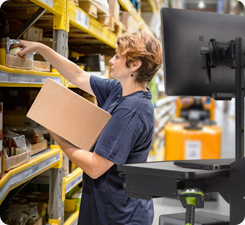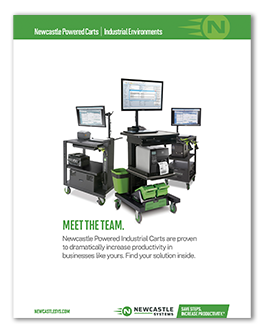
If you work in the manufacturing industry, you already know that accuracy and speed are two of the most important qualities for success. In an environment that continues to demand faster turnaround times that include zero mistakes, manufacturers should look for solutions that allow them to achieve these goals.
Another consideration is the manufacturing workforce. According to a report by the Manufacturing Institute called “The Aging of the Manufacturing Workforce,” attracting and retaining quality workers is one of the top challenges facing the industry. Specifically, manufacturers need to adopt strategies that consider the safety and comfort of workers.
Enter mobile workstations. These solutions provide manufacturers with the ability to improve efficiency, productivity, and safety. Here are some of the ways mobile workstations can take your manufacturing operations to the next level.
What are Mobile Workstations / Mobile Carts?
Mobile workstations are also referred to as mobile carts. These are moveable technology solutions that can hold a variety of equipment like scanners, label printers, and other essential accessories like tools, storage, and swappable batteries.
There are several types of mobile workstations that range from entry-level to heavy-duty. Some manufacturers will implement several different kinds of mobile carts, depending on the applications required.
How Mobile Workstations Improve Manufacturing Efficiency
Here are the many ways manufacturers can increase efficiency by using mobile workstations:
1. Streamlined Operations
At the core of manufacturing efficiency is finding ways to streamline individual processes. Mobile workstations can boost productivity by reducing the amount of time required to complete a task. Instead of tying employees to a fixed workstation, mobile carts allow workers to be more productive and reduce some of the steps required in the production process.
2. Enhanced Adaptability and Flexibility
 Traditional workstations limit the adaptability and flexibility of manufacturing operations. However, mobile workstations provide workers with the flexibility they need to accommodate any process improvements or changing production requirements without having to go through costly or time-consuming reconfigurations. This allows a manufacturer to respond quickly to changing conditions.
Traditional workstations limit the adaptability and flexibility of manufacturing operations. However, mobile workstations provide workers with the flexibility they need to accommodate any process improvements or changing production requirements without having to go through costly or time-consuming reconfigurations. This allows a manufacturer to respond quickly to changing conditions.
3. Work-in-Progress Tracking
Accurately tracking the status of work in progress (WIP) in your manufacturing plant is essential to provide a clear picture of productivity and capacity. Mobile workstations make it easier to get real-time visibility of your entire manufacturing operation, particularly when you incorporate technology like smart manufacturing solutions and RFID tags, which can provide an accurate count of raw materials and products throughout the facility.
4. Order Picking
 Many people mistakenly believe that “picking” only happens in warehouses. However, manufacturers must “pick” raw materials from inventory shelves to keep the production process moving efficiently. Incorporating mobile workstations onto the manufacturing floor can allow workers can pick items from where they are stored and get them to where they’re needed. This can reduce or eliminate bottlenecks in the production process and reduce picking errors.
Many people mistakenly believe that “picking” only happens in warehouses. However, manufacturers must “pick” raw materials from inventory shelves to keep the production process moving efficiently. Incorporating mobile workstations onto the manufacturing floor can allow workers can pick items from where they are stored and get them to where they’re needed. This can reduce or eliminate bottlenecks in the production process and reduce picking errors.
5. Finished Goods Inventory
Once products complete the manufacturing process, they are often routed to an on-site warehouse for storage before being forwarded to customers. Mobile workstations can streamline this process and improve the accuracy of finished goods inventory. Instead of requiring manual inventory counts, mobile carts can be equipped with RFID tag readers, which integrate with a warehouse management system (WMS) for seamless finished goods inventory control.
6. Better Asset Maintenance
Having mobile carts throughout the factory allows for better asset maintenance, which reduces downtime and overall maintenance costs. Mobile carts can help workers perform regular inspection and maintenance of machinery to reduce frequent breakdowns. Manufacturing equipment can also be outfitted with sensors, which are tied to a monitoring system. This can detect anomalies in machinery to ensure optimal performance at all times.
7. Shipping Validation
The real-time visibility and tracking provided by the technology integrated into mobile workstations can benefit suppliers and customers in addition to internal staff. When you share this data with your logistics partners or customers, you can provide real-time shipping validation of products directly from the factory floor.
8. Improved Worker Safety and Ergonomics
 A common challenge in manufacturing environments is employee turnover due to accidents and general job dissatisfaction. Mobile carts make manufacturing work more ergonomic, meaning the job is tailored to the worker instead of requiring the worker to fit themselves to a difficult task. Having adjustable height stations with ergonomic features can reduce worker fatigue and job-related accidents, which can improve job satisfaction and reduce turnover.
A common challenge in manufacturing environments is employee turnover due to accidents and general job dissatisfaction. Mobile carts make manufacturing work more ergonomic, meaning the job is tailored to the worker instead of requiring the worker to fit themselves to a difficult task. Having adjustable height stations with ergonomic features can reduce worker fatigue and job-related accidents, which can improve job satisfaction and reduce turnover.
9. Improves Quality Control
When workers are forced to move around or perform dangerous tasks, this increases the opportunities for human error. Having manufacturing technology mobile on the factory floor improves quality and reduces costs. Automation solutions offered by mobile carts can minimize inefficiencies and defects and optimize production schedules.
10. Real-Time Data Access and Communication
Having mobile carts on the factory floor gives the business access to real-time data about the operations and a means of instant communication with workers. The integrated technology solutions on the carts allow for instant access to things like inventory levels, production schedules, and quality control data, which allows for more informed business decisions.
Key Considerations When Implementing Mobile Workstations
Before implementing mobile carts in your manufacturing plant, there are several different things your business should consider:
- Size and durability requirements — Will you need a slim or heavy-duty mobile workstation to fit in certain spaces or hold up to certain environments?
- Battery length needed — Consider how long you need your mobile workstation to last before recharging or swapping the batteries.
- Customization options — A standard mobile workstation will be more cost-effective, but it may not include everything you want or need. It’s generally better to make a list of all the features you would like so you can get a customized solution.
- Cold storage requirements — Not all mobile carts are designed to operate in low temperatures. If your manufacturing plant is also a cold storage environment, you’ll want to choose a configuration that can handle these temps.
In today’s competitive and fast-paced world, businesses are constantly seeking ways to improve productivity and efficiency. Various technology solutions have been a game-changer in the manufacturing industry when it comes to reducing errors and improving conditions for workers. With solutions like mobile workstations, manufacturers can place technology where it is needed most to streamline workflows and improve overall results.












